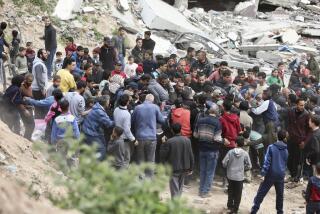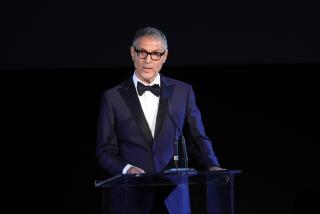Herzog Calls Iraq a Nest of Terrorism : Mideast: The Israeli president, visiting Los Angeles, says that the danger posed by Saddam Hussein must be neutralized.
- Share via
Israeli President Chaim Herzog called Sunday night for the elimination of what he said is a nest “of world terror” in the Iraqi capital of Baghdad under the command of Saddam Hussein.
Compromising with Hussein, he said, is out of the question because it would allow the Iraqi president “to continue to develop the most dangerous weapons of war--nuclear, chemical and biological--with which to continue to threaten world society.”
He told a black-tie dinner at the Century Plaza Hotel--where he received the Simon Wiesenthal Center’s Humanitarian Award--that there must be a determined effort to neutralize the terrorist activities that Hussein has allowed to proliferate in Baghdad.
“It is the capital of world terror,” Herzog said. “The major terrorist organizations in the world have found refuge and established their headquarters in Baghdad.
“They will be in a position, if Saddam Hussein is allowed to get away with it, to terrorize the world with the most terrifying weapons that mankind has known, which he is developing.”
In Israel’s parliamentary system of government, Herzog, 72, serving his second term as president, acts as a unifying national symbol, whereas the prime minister and his Cabinet hold most of the political power.
Still, Herzog’s views are regarded by government analysts as more than those of a political figurehead. Herzog was a major general in the Israeli army and chief of military intelligence before going into politics, and he is a noted military historian.
Earlier Sunday, Herzog said that the current crisis gripping the Middle East is a vindication of his country’s policies and its sometimes controversial use of military force in the region.
“For years we warned the world against the monster that was emerging in Baghdad,” Herzog told 1,500 supporters at the Stephen S. Wise Temple in Bel-Air.
Well before the world community realized the danger posed by Hussein, he said, Israel recognized the threat and bombed an Iraqi nuclear reactor under construction in 1981.
“Can you imagine what a danger would have faced the Middle East, and probably the rest of the world, if that megalomaniac had a nuclear capability today?” Herzog asked.
The world largely dismissed Israel’s warnings that Baghdad was becoming a capital of world terrorism, he said, adding that some Western countries helped Hussein develop into a military power.
“We warned against this and we were scoffed at,” Herzog said. “We warned against this and we were ignored. We took action against this and we were condemned.”
Herzog spoke during a rally for Operation Exodus, an international effort to raise $600 million over three years to resettle Soviet Jews to Israel. Richard Gunther, co-chairman of the local Operation Exodus effort, said about $26 million has been raised here.
An appreciative audience at the temple interrupted the Israeli president’s address 16 times with applause as he defended his country’s foreign policy, recalled slain Egyptian President Anwar Sadat as a man of peace and decried “cynical prejudice” against Israel in the United Nations.
The U.N. readily condemns Israel’s suppression of the Palestinian uprising, but “when an Israeli tourist bus in Egypt was gunned down by terrorists, was a whisper about those events heard in the hallowed precincts of the Security Council?” he asked.
Bloodshed elsewhere in the world also is ignored, he said.
“The world has been observing the mass slaughter taking place in Ayodin in India as Hindus attempt to destroy a Moslem mosque in order to build a temple on it,” Herzog said.
The United Nations, however, has remained silent.
“After all,” he said sarcastically, “Israel is not involved.”
To loud applause from the audience, Herzog said the U.N.’s preoccupation with Israel reflected “pure and unadulterated old-fashioned anti-Semitism.”
Herzog praised President Bush’s handling of the crisis involving the Iraqi invasion of Kuwait. But he said Western politicians and pundits have repeatedly misread events in the Middle East and did not anticipate, for example, the rise of Hussein or the fall of the Shah of Iran.
“The battleground this time is not the Sinai or the Golan Heights,” he said. “The battleground is the media, the strategic objective is world public opinion.”
More to Read
Sign up for Essential California
The most important California stories and recommendations in your inbox every morning.
You may occasionally receive promotional content from the Los Angeles Times.













